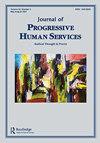社会工作作为白人的产物和项目,1607–1900
IF 0.8
Q1 SOCIAL WORK
引用次数: 21
摘要
白色是历史和当代社会工作的一个显著特征。因此,社会工作的历史并没有反映这一事实;因为白色的一个决定性的品质是它不容易识别或批评自己。然而,为了与社会正义的使命和批判性自我反思的义务保持一致,社会工作面临着清算自身白人的必要性。由于缺乏对该职业的白人特征的承认,社会工作表现出理论缺陷和实践不一致,并陷入对其自身历史的歪曲,从而损害了其表面上的身份和使命的真实性。本文从第一个英美殖民地的定居开始,一直到十九世纪之交,描绘了白人和社会工作的共生演变,这表明社会工作在许多方面都是白人的产物和项目。本文利用历史和史学分析来举例说明一种构建反叙事的模型,这种反叙事颠覆了限制传统社会工作历史的霸权白人的规范界限。本文章由计算机程序翻译,如有差异,请以英文原文为准。
Social Work as a Product and Project of Whiteness, 1607–1900
ABSTRACT Whiteness is a distinctive feature of historical and contemporary social work. Consequently, histories of social work do not reflect this fact; for a defining quality of whiteness is that it does not readily identify or critique itself. In keeping with its mission of social justice and obligation of critical self-reflection, however, social work faces the imperative of reckoning with its own whiteness. For lack of acknowledgment of the whiteness that characterizes the profession, social work exhibits theoretical shortcomings and practical incongruences, and lapses into a misrepresentation of its own history that compromises the authenticity of its ostensible identity and mission. The present article begins with the settlement of the first Anglo-American colony and proceeds to the turn of the nineteenth century, mapping the symbiotic evolutions of whiteness and social work, which demonstrate social work to be, in many ways, a product and project of whiteness. This article utilizes historical and historiographical analysis to exemplify a model for constructing counter-narratives that subvert the normative boundaries of hegemonic whiteness that constrain traditional social work histories.
求助全文
通过发布文献求助,成功后即可免费获取论文全文。
去求助
来源期刊

Journal of Progressive Human Services
SOCIAL WORK-
CiteScore
3.20
自引率
8.30%
发文量
14
期刊介绍:
The only journal of its kind in the United States, the Journal of Progressive Human Services covers political, social, personal, and professional problems in human services from a progressive perspective. The journal stimulates debate about major social issues and contributes to the development of the analytical tools needed for building a caring society based on equality and justice. The journal"s contributors examine oppressed and vulnerable groups, struggles by workers and clients on the job and in the community, dilemmas of practice in conservative contexts, and strategies for ending racism, sexism, ageism, heterosexism, and discrimination of persons who are disabled and psychologically distressed.
 求助内容:
求助内容: 应助结果提醒方式:
应助结果提醒方式:


